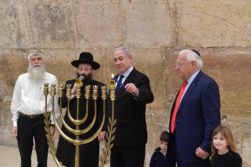
PM Netanyahu lights 1st Chanukah candle with US Ambassador David Friedman. Photo courtesy of Koby Gideon (Israeli GPO)
Every year, world leaders and various nations wish Jews a Happy Hanukkah, and this year it wasn’t just the sentiments themselves that stood out: Who was making the wishes in one case made a broader impact than their kind words. The United Arab Emirates (UAE) Embassy to the United Kingdom, representing a Muslim nation not at peace with Israel, took to Twitter on December 22 to express their Hanukkah greetings, tweeting, “Our warmest wishes to our friends of the Jewish faith on the occasion of the first day of the Festival of Lights. Wishing you a joyful #Hanukkah.”
Other embassies for the UAE expressed similar thoughts on Twitter, leading the Director General of Israel’s Ministry of Foreign Affairs to repost four of the global greetings on his Twitter page. “Among the many heartwarming #Hanukkah wishes from world leaders & Foreign Ministries, we were delighted to also receive greetings from embassies of the #UAE,” tweeted Yuval Rotem. He went on to say that they “appreciate these warm messages” and hope to see relations between Israel and the UAE “further grow in 2020!”
The UAE wishes marked the second time in a week that the UAE made Middle East peace news. One day before the UAE’s UK Embassy tweet on Hanukkah, the UAE Foreign Minister reposted on Twitter an article calling for an alliance between Arabs and Jews.
A gradual thaw of Israeli-Arab relations has been occurring for a while now and is no longer relegated to reports of covert diplomacy or secret security coordination. Israeli Prime Minister Benjamin Netanyahu has been touting the improvements, but it’s still noteworthy to see expressions of support for Jews and especially Israel by Arab nations.
Meanwhile, in an instance where the message made a bigger impact than the speaker, British Prime Minister Boris Johnson continued the UK tradition of delivering Hanukkah greetings. However, his two-minute video posted to Twitter went well beyond holiday sentiments, focusing on the importance of Jews to the UK and the struggle against antisemitism.
In the video, Johnson noted in his comments to the Jewish people that Hanukkah is “a time to celebrate not just the miracle of the oil but also your unique identity.”
Johnson goes on to say that recent years “have not been easy ones for British Jews” due to antisemites in the media, online and elsewhere who have “spread their brand of noxious hatred far and wide.”
However, the story of Hanukkah doesn’t just signal Jewish pride in their own identity, according to Johnson, it also highlights an important difference between the Jewish Maccabee fighters’ victory 2,200 years ago over the Greeks and the situation today.
“When the Maccabees drove the forces of darkness out of Jerusalem, they had to do so on their own,” said Johnson in the video. “Today, as Britain’s Jews seek to drive back the darkness of resurgent antisemitism, you have every decent person in this country fighting by your side.”
The video was attached to a Twitter post from Johnson noting that “Britain would not be Britain without its Jewish community. And we will stand with you and celebrate with you—at Chanukah and all year round.”
Elsewhere around the world, the Prime Minister of India, Narendra Modi posted “Happy Festival of Hanukkah to all the people of Israel” in a tweet written in Hebrew, while a press release from Netanyahu’s office said Russian Prime Minister Vladimir Putin gave a Hanukkah greeting to Netanyahu during a bilateral call between the two leaders.
And as is the annual tradition in the United States, Presidential Hanukkah greetings were delivered once again, with President Donald Trump saying the relationship between the US and Israel is “stronger than ever.”
In a statement published to the White House website, Trump said of Hanukkah, “Throughout the coming eight days, each candle to be lit on the menorah will signal to the world that freedom and justice will always shine brighter than hate and oppression.”
And when Arab nations are reaching out to Jews and Israel, that hope shines brighter still.
(By Joshua Spurlock, www.themideastupdate.com, December 27, 2019)
